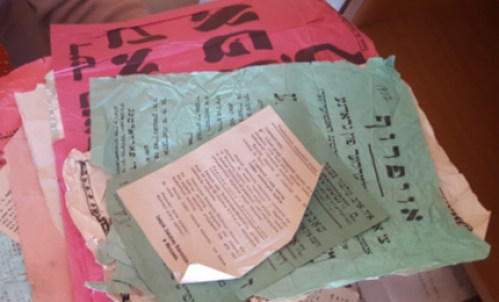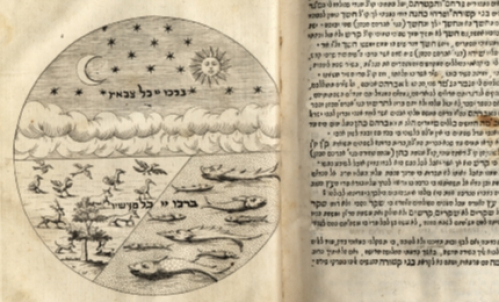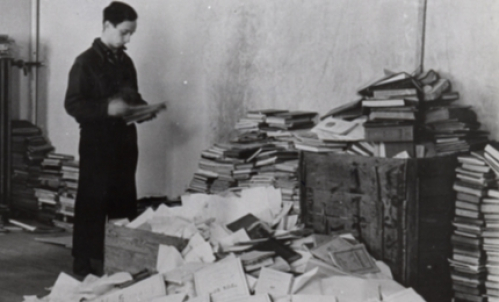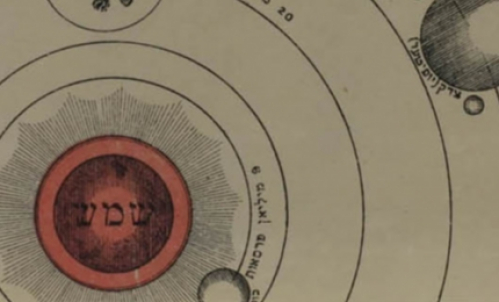News & Features
Newsletters | YIVO in the Media | Press Releases

Letters to Afar Opens at the Museum of the City of New York on October 22, 2014
The YIVO Institute for Jewish Research and the Museum of the City of New York announce the U.S. premiere of Letters to Afar, a groundbreaking video art exhibition by award-winning artists Péter Forgács and The Klezmatics. The exhibition will be on view at the Museum of the City of New York from October 22, 2014 through March 22, 2015.

YIVO Launches the “YIVO Digital Archive on Jewish Life in Poland”
(NEW YORK, June 1, 2013)– The YIVO Institute for Jewish Research is delighted to announce the launch of the YIVO Digital Archive on Jewish Life in Poland, at polishjews.yivoarchives.org. The website provides access to thousands of digitized documents, manuscripts, photographs, artworks, films, and audio recordings relating to the rich and ...

How One Town Overcame Its Past: Interview with Magda Teter
The bishop of Sandomierz and the chief rabbi of Poland at a prayer service at the Jewish cemetery. (Courtesy Magda Teter) On Thursday, June 12, at 7:00 pm, Professor Magda Teter will deliver the Podbrodzer Lecture at YIVO. In a small Polish town, over 300 years ago, Jews were accused of killing a Christian ...

YIVO’s 40th Anniversary/25th Anniversary of Relocation to New York (1965)
Today’s episode was original heard on January 17, 1965. On the 40th anniversary of the founding of YIVO and the 25th anniversary of its relocation to New York, host Sheftl Zak talks about the annual YIVO conference which had begun the night before. As the February 1965 edition of Yedies ...

YIVO in the News & Staff Notes – May 2014
The new YIVO Digital Archive on Jewish Life in Poland is now linked to from many other websites and has received coverage in The New York Times: "New Web Portal Provides Access to Historic Materials on Jewish Life in Poland," Jewish Heritage Europe, and Arts Journal. Mosaic Magazine reprinted the Times article.
The YIVO Encyclopedia of Jews in Eastern Europe was designated as "the single best resource on Jewish life in interwar Central and Eastern Europe" by the Centropa Summer Academy in its May e-newsletter.
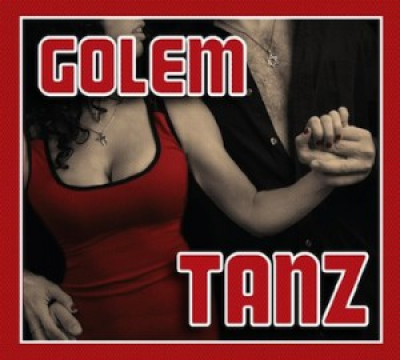
We’ve Been Through So Much; Now We’re Dancing: Interview with Annette Ezekiel Kogan of Golem
Klezmer-rock band Golem has been reinterpreting Yiddish and East European Jewish music for the 21st century since 2000. YIVO Public Program Director Helena Gindi spoke with founder and lead singer of the band, Annette Ezekiel Kogan, about Golem’s latest album, Tanz, which was released on May 13 on the Mexican label Discos Corason.
Golem’s CD release party for Tanz will be held at Joe’s Pub on May 29, 2014.
Listen to clips from Tanz on Golem’s website.

“The Strongest Man in the World”: New Photo Book About Zishe Breitbart Now Online
Gary Bart, great-nephew of the circus strongman Zishe Breitbart, has just published an online photobookshowcasing artifacts related to his famous forebear that he has been roaming the world collecting for decades. Breitbart, known to Jewish audiences as Shimshn-hagibr (Samson the Mighty), was born into a family of blacksmiths in Lodz. ...

YIVO Video and Audio Archive
Visit yivo.org/Video-Audio-Archive to view or listen to many of YIVO’s programs from 2005 to the present. Some of our most recent additions include:
Sunday, April 6, 2014: Passing the Torch: Jewish Music Archives and the Future of Yiddish Song, a symposium that brought together archivists, scholars and performers to discuss the history and creation of Yiddish folk music archives, and the future of the study and performance of Yiddish song today. The event was dedicated to the memory of Chana Mlotek, YIVO’s Music Archivist from 1978 until her recent passing at age 91 in 2013. Watch the video.

From the Pages of Yedies
by ROBERTA NEWMAN The 1960s marked a new era for public interest in the Holocaust. The trial of Adolf Eichmann in 1961 was the first trial to be televised internationally and drew large audiences in the United States. In 1964, I Never Saw Another Butterfly,an anthology of poems and drawings by children ...

Two Gates: Hillel Halkin Revisits Vladimir Jabotinsky’s Life and Literature
How to re-examine Vladimir Jabotinsky, a man whose political life kept him almost constantly in the public eye?
